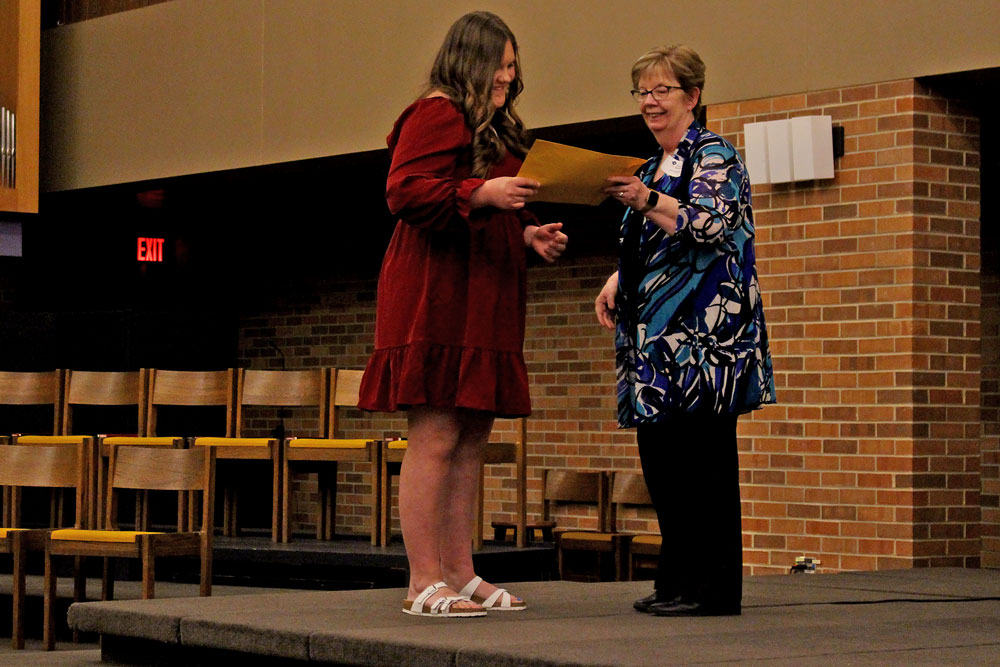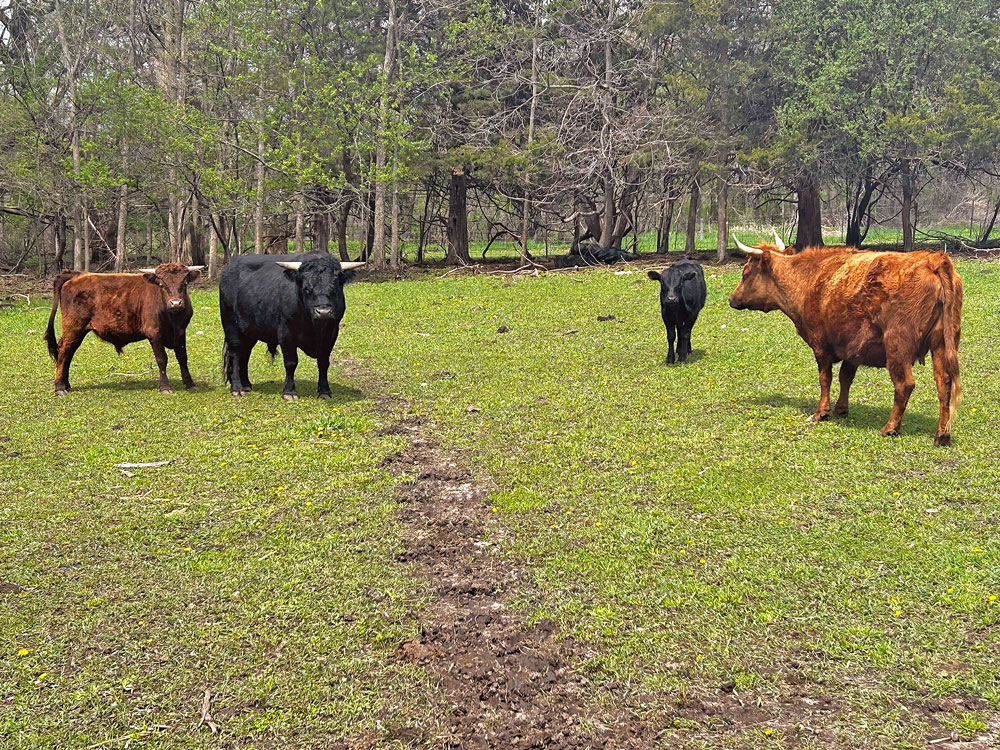Iowa Ag Secretary Naig touches on many topics at First Citizens Bank ag luncheon

By Bob Steenson, bsteenson@charlescitypress.com
The Iowa secretary of agriculture was the featured speaker Wednesday morning when a local bank branch brought together various experts to talk with area farmers and others involved in ag production and treat them to lunch.
Ag Secretary Mike Naig talked about a variety of ag-related issues and answered questions, including about the proposed carbon dioxide pipeline projects currently working themselves through the state permitting process.
“We invited our ag base to get together and listen to some wonderful speakers about agriculture and what’s on the forefront,” said Cathy Rottinghaus, market president for First Citizens Bank in Charles City, adding that it’s important to share knowledge from various experts.
“There’s a lot of different information out there and we try to provide a vehicle so farmers can learn from the different aspects, and we like the camaraderie as well,” she said.
About 60 area ag producers and more than a dozen First Citizens staff were at the event, held at the Youth Enrichment Center at the Floyd County Fairgrounds.
Other speakers at the Wednesday morning program were attorney Collin Davison, from Laird Law Firm in Mason City, talking about trusts, and farm management analyst Kent Thiesse, who talked about farm inputs and the things that affect farmers as they make some choices going into the next growing season.

Secretary Naig told the Press after his talk that he always makes sure to leave plenty of time for questions and answers when he’s invited to speak at an event such as the ag luncheon.
“I want to hear what’s on people’s minds,” he said. “Asking about trade and certainly the pipeline, water quality, …, but this time of year you’re really trying to roll up and take stock of, what did we experience last year, what were our main challenges, what were some of the accomplishments? And then really now we’re shifting to, well, what’s the new year bring us? What does 2023 have in store?”
Naig talked about the uncertainty that farmers face.
“It’s true in agriculture that there are always things you can control and things you can’t control, weather being chief among them. But things like the Russian invasion of Ukraine and the disruption of the global supply chain, those are things you also don’t have director control over, but you certainly have to deal with them and you’ve got to manage risk,” he said.
“It’s kind of laying out just what we see looking ahead and then, what are the ways that we as the state of Iowa, or certainly the Department of Ag, can then try to enable farmers to be able to have an opportunity to do the things that they do best — and that’s be productive,” Naig said.
A lot of the focus this year is on what will be in the next Farm Bill, with the current law expiring in September, he said, adding that it’s “hugely impactful to Iowa and Iowa agriculture.”
His talk, he said, “is kind of trying to knit those together and say, here’s what’s happening on a policy standpoint, here’s how that interacts with some of the challenges or the realities that we see on the ground. Especially this time of year you’re trying to look ahead and then see what’s on people’s minds.”
Near the end of the question and answer period, a member of the audience asked Naig about his thoughts on the CO2 pipeline projects.
Remarking he was surprised it had taken that long for the topic to be raised, Naig joked that his time was up, but then continued.
“I’m probably not going to give you a completely satisfactory answer. Let me tell you the lay of the land as I see it. I guarantee there’s people with lots of opinions in the room and that’s OK, you’re entitled to that,” he said.
Naig said he had no formal role in the decision-making process of whether any of the pipeline proposals will be approved, “but I’m watching it very, very closely, as you might imagine.”
Naig said one question he is asked is if the pipelines really matter to the ethanol industry.
“The answer is yes,” he said. “Whether you like it or not, whether you agree with it or not, (the pipelines offer) an upside to ethanol and that’s why you’ve seen 35-plus ethanol plants (in Iowa) sign on to one of these projects or another.”
Naig said lowering the carbon intensity score of ethanol is important to keep the biofuel competitive, and the pipelines offer a way to do that.
“A lot of it’s coming from the private sector and again, you can like that or not or agree with it or not, but I’m telling you as I sit in this chair (as secretary of agriculture), it impacts and it’s important to an industry that grinds 50% of the corn that we grow in the state of Iowa, so it matters,” he said.
Naig said he looks at whether the companies are following state law, and especially what are their plans to make sure any land disturbed is restored to its previous condition.
“That’s an area that I do feel like we need to be, as Department of Ag, that we can be focused and try to be helpful there, ensuring and making sure that there’s teeth in those agreements, that companies and developers live up to those commitments. That’s really important to me,” he said. “I’m a farmer. I get it. There’s been some cases of bad actors in the past, so it’s not unwarranted to think about that.”
Regarding the issue of eminent domain, Naig said, “I advise people all the time that you have a right to negotiate, you have a right to not agree. You have a right to be opposed. You have a right to support. I hear from a lot of folks on all sides of it.
“I think the Legislature will potentially have an opinion about eminent domain for you for certain types of projects and should there or should there not be a threshold of voluntary agreement that’s in place before a project would qualify,” he said. “There’s been some legislation that’s knocking around. I don’t know that we’ve seen that actual bill that would move if something were going to move this year, so I’m going to reserve the right to have an opinion about that at a later date when we actually see that legislation.”
Talking about water quality, Naig said there are two sides – water quality and water quantity.
He said his department worked with the Iowa Department of Natural Resources and with Iowa Homeland Security and Emergency Management last year to develop the state’s first drought plan.
“We’d had different programs and local people looking at that, but this was really a way to get together, formalize that and say water quantity is something we ought to be thinking about,” Naig said. “It certainly impacts agriculture. It certainly impacts consumers’ drinking water supply, and industries.”
He said the department built a framework to predict how drought might be affecting the state and what actions the state can take to mitigate negative impacts.
“We’ve got the ability to look ahead and predict and forecast what might be coming and then what are the actions that can be taken if we end up in a situation like we’re seeing in a lot of the country with water availability,” he said.
“Water quality continues to be a focus for us. We’re crossing a threshold of 10 years of implementing Iowa’s nutrient reduction strategy,” Naig said.
“We’ve changed the trajectory of water quality and work on soil health in this state just in the last couple of years. We had to ramp up, and so really we didn’t hit full stride with implementing the strategy until a couple of years ago. But I’m also very careful to say, we can be proud of where we are, and we’ve accomplished a lot, but we’ve got a lot to do,” he said.
“What I see across the state is, in any measure that you want to take, practice adoption, engagement of farmers, the number of partners and entities that are engaged in, not just talking about water quality but doing, and the resources that we’ve been able to put toward this effort, we’re doing more today than at any time in Iowa’s history. And we all want to do more and need to do more,” Naig said.
“People need to know that other states are watching very closely what we’re doing, and modeling what Iowa’s doing in terms of our nutrient reduction strategy. That’s something that we can be pretty proud of, but let’s keep moving forward. That’s the main message,” he said.










Social Share